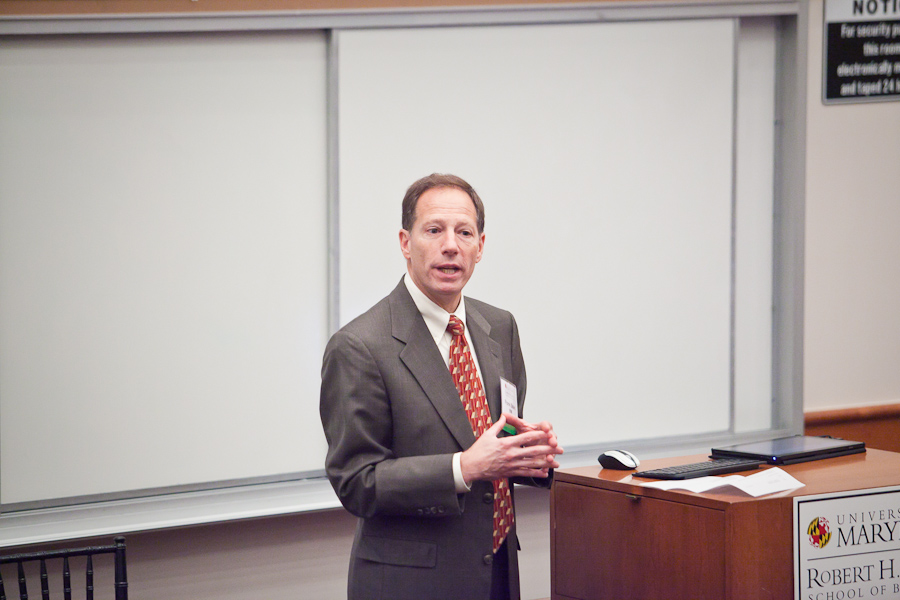
The best way to do this – specifically how to effectively and efficiently sort through and manage enormous amounts of healthcare data to improve quality of care – was the topic of discussion among thought leaders from the Smith School, IBM and the federal government at the second annual IBM Business Analytics Workshop. Smith and IBM co-hosted the daylong event at Van Munching Hall on May 17, 2012.
Speakers delved into the enormous task of organizing and utilizing data in the healthcare industry, identifying shortcomings within the U.S. healthcare system and areas where analytics can and have improved healthcare. The workshop covered healthcare topics ranging from data in government healthcare research to managing patient information at the bedside.
Michael Ball, Orkand Corporation Professor of Management Science and associate dean for faculty and research, organized the event on behalf of the Smith School. He welcomed the more than 120 people in attendance and introduced keynote speaker, Lt. Col. Thomas J. Cantilina of the U.S. Air Force Medical Service.
Cantilina spoke about the need to change the way healthcare data is analyzed, adding that a patient-centric system needs to replace the money-centric system currently in place.
“When you start looking at the drivers in healthcare today, our major driver in healthcare has been money. Healthcare data is centered around the money. Some systems are a little bit better educated, so its not just money, but it still plays a large role,” he explained. “Wouldn’t it be a different world if our healthcare analytics were centered around the patient. … We are taking care of the most important people in the world – the men and women who get up daily and fight for our freedom – they deserve the best system we can give them.”
Cantilina’s keynote was followed by a presentation from Ritu Agarwal, the director of Center for Health, Information and Decision Systems (CHIDS) and a professor at the Smith School. Agarwal has been at the forefront for implementing business IT processes in the health care industry. She talked about her work with CHIDS and the concept of Learning Health Systems (LHS) that is gaining momentum as more and more electronic healthcare data becomes accessible.
Agarwal said the idea is to enable learning from the collective experience of a care delivery network as recorded in the observational data, then use that data to improve the quality of care provided in real-world settings. The health care analytics research group at IBM Research has been working on developing methodologies to pull insights from several sources of healthcare data to help doctors and nurses make better decisions for patients early on. Agarwal talked about CHIDS’ work in this effort, and describe research prototypes the center has developed.
Agarwal’s presentation was followed by a look at how IBM’s “Jeopardy”-winning technology, Watson, is being utilized in healthcare. Basit Chaudhry, a medical scientist at IBM Research, detailed the way Watson can analyze questions, sift through enormous amounts of structured and unstructured data, learn, and present a set of likely answers and options. Watson is unique because it can interpret the nuances of natural language – making it a quiz show champ – and even pinpoint where data is missing. IBM is currently exploring how to use Watson for healthcare, including how it can be used beside for patient diagnosis.
Other speakers included Jianying Hu, a researcher and manager of Healthcare Analytics Research at IBM’s T.J. Watson Research Center. She detailed how healthcare analytics can be used for personalized care delivery and management.
After lunch, attendees heard from Margrét Bjarnadóttir, a researcher at the Smith School. She detailed the enormous opportunity data from health insurance claims offers to researchers, if they can efficiently sort through it. She talked about how claims data is being used for both healthcare cost predictions and drug surveillance.
Then Rashmi Mathur of IBM Business Analytics and Optimization discussed how health plans must become much more consumer-centric with the way they present data with the rollout of healthcare reforms.
Bruce Golden, the France-Merrick Chair in Management Science at the Smith School, talked about how analyzing healthcare data can offer important insights on the quality of care patients receive. His recent research projects utilize data from a large mid-Atlantic trauma hospital. His findings shed light on how hospital discharge decisions are made, which according to the research, are tied to the number of scheduled surgeries. This can have big impacts on the rate of readmission for patients discharged too soon.
The day wrapped up with a panel discussing whether analytics and big data have a major impact on healthcare costs. Panelists included Guodong “Gordon” Gao, assistant professor of decision, operation and information technologies at the Smith School; Karoline Mortensen, an assistant professor in the Department of Health Services Administration; William Rollow, a board-certified doctor of family medicine; Abdul Shaikh, a program director in the National cancer Institute’s Health Communication and Informatics Research Branch; and Terry Sharrer, a Smithsonian Institution historian and medical curator.
Media Contact
Greg Muraski
Media Relations Manager
301-405-5283
301-892-0973 Mobile
gmuraski@umd.edu
About the University of Maryland's Robert H. Smith School of Business
The Robert H. Smith School of Business is an internationally recognized leader in management education and research. One of 12 colleges and schools at the University of Maryland, College Park, the Smith School offers undergraduate, full-time and flex MBA, executive MBA, online MBA, business master’s, PhD and executive education programs, as well as outreach services to the corporate community. The school offers its degree, custom and certification programs in learning locations in North America and Asia.